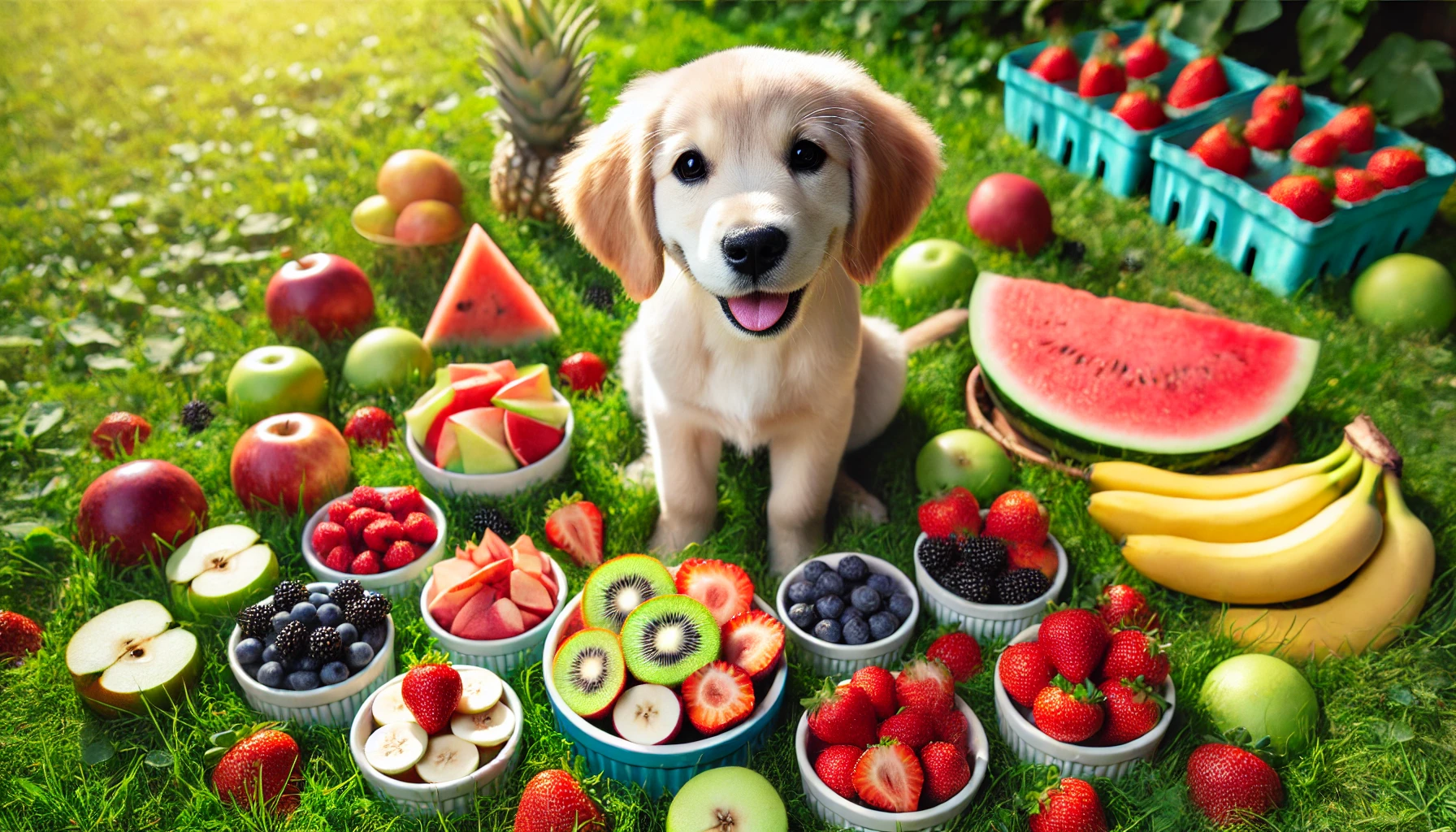25 Best and Worst Fruits for Dogs: What Fruit Can Dogs Eat Safely?

Feeding fruits to dogs can be both healthy and enjoyable, but it’s essential to know what fruit can dogs eat safely. While many fruits provide important nutrients, some can cause health problems. Offering fruits like apples or strawberries can be a great way to boost a dog’s diet, but others—like grapes—are dangerous.
In this article, we’ll explore fruits dogs can eat, those to avoid, and how to serve them properly. By the end, you’ll understand what fruits can dogs eat and cannot eat to keep your furry friend happy and healthy.
Benefits of Feeding Fruits to Dogs
Adding fruits to your dog’s diet offers several health benefits. Here’s why fruits good for dogs are worth considering:
- Rich in Vitamins and Minerals: Fruits like strawberries, apples, and bananas contain vitamins A, C, and potassium, which support immune health and muscle function.
- High in Fiber: Fiber improves digestion and helps prevent constipation.
- Hydration Boost: Water-rich fruits, such as watermelon, keep dogs hydrated, especially during hot weather.
- Natural Antioxidants: Berries like blackberries and blueberries provide antioxidants, which reduce inflammation and promote long-term health.
However, it’s essential to know what fruits are good for dogs and which ones can cause harm. While there are many fruits safe for dogs, some can trigger allergies or digestive issues if given in excess.

Safe Fruits for Dogs
Not all fruits are equally safe, so it’s important to know what fruit can dogs eat without issues. Here’s a list of fruits dogs can eat safely, along with their benefits:
- Apples
- Apples are a great source of fiber and vitamins A and C.
- Can dogs have apples? Yes, but remove seeds and the core before serving.
- Strawberries
- Can dogs eat strawberries? Yes! They contain antioxidants and help whiten teeth naturally.
- Are strawberries good for dogs? Yes, but feed in moderation due to their sugar content.
- Blackberries
- Can dogs eat blackberries? Yes, these berries are high in antioxidants and fiber.
- Are blackberries good for dogs? Absolutely! Offer them fresh and unsweetened for the best benefits.
- Bananas
- Can dogs have bananas? Yes, bananas are a healthy treat with potassium, but serve them in moderation.
- Watermelon
- Is watermelon good for dogs? Yes, it’s low in calories and high in water, making it perfect for hydration.
- Watermelon OK for dogs? Yes, but avoid seeds and the rind.
- Pineapples
- Can dogs eat pineapples? Yes, but only in small portions due to their high sugar content.
- Are pineapples good for dogs? They can be when served in moderation.
- Kiwis
- Can dogs eat kiwis? Yes! They are rich in vitamin C and fiber.
These fruits safe for dogs provide nutrients and variety. But always introduce new fruits gradually to monitor for any allergic reactions.
Fruits to Avoid for Dogs
While many fruits are healthy, some can be toxic or harmful. Knowing what fruits can dogs not eat is crucial to avoid health risks. Here are the fruits you should keep away from your dog:
- Grapes and Raisins
- These are extremely toxic and can cause kidney failure in dogs, even in small amounts.
- Cherries
- Cherry pits contain cyanide, which is dangerous for dogs. The pits can also cause blockages.
- Pomegranate
- Are pomegranates good for dogs? No, they can cause stomach issues, including vomiting and diarrhea.
- Oranges
- Can dogs eat orange? It’s best to avoid them due to high acidity, which can upset a dog’s stomach.
- Avocado
- Avocados contain persin, a toxin that can lead to vomiting and diarrhea in dogs.
- Berries to Avoid
- While many berries are safe, avoid juniper and holly berries, as they can be toxic.
- Are blackberries bad for dogs? No, blackberries are safe, but some berries in the wild can be harmful.
Knowing what fruits are bad for dogs will help you avoid accidental poisoning. Be cautious and stick to the recommended fruits.
Can Puppies Eat Fruits?
Yes, puppies can eat certain fruits, but with extra caution. Their digestive systems are still developing, so it’s important to introduce fruits gradually. Here’s what fruits can puppies eat safely:
- Strawberries
- Can puppies eat strawberries? Yes, in small amounts. They offer vitamin C and antioxidants, but avoid overfeeding.
- Apples
- Apples are a safe treat for puppies as long as the seeds and core are removed.
- Bananas
- Puppies can have small banana slices as a quick energy boost.
- Blueberries and Blackberries
- Can dogs have blackberries? Yes, and these berries are safe for puppies too. Blackberries and blueberries provide antioxidants and fiber.
- Watermelon
- Watermelon is excellent for hydration. Just be sure to remove seeds and rind.
Puppies should only have fruits occasionally, in very small portions. Always watch for signs of an upset stomach after trying new foods. Avoid processed options like fruit snacks. Can dogs have fruit snacks? No, these contain added sugars that are unhealthy for dogs and puppies alike.

Fruits to Give in Moderation
Some fruits are safe but should be given in controlled portions. While they offer health benefits, excess consumption can lead to stomach upset or weight gain. Here are some fruits that need moderation:
- Pineapples
- Can dogs eat pineapples? Yes, but only in small amounts because of high sugar levels.
- Is pineapple bad for dogs? Not in small portions, but too much can cause digestive issues.
- Mango
- Mango is good for dogs but only in limited quantities. Remove the pit and peel, as they can cause choking or blockages.
- Bananas
- Can dogs have bananas? Yes, but they should be served occasionally to avoid weight gain due to their high calorie content.
- Blackberries
- Are blackberries bad for dogs? Not inherently, but too many can cause diarrhea.
- Can a dog eat blackberries? Yes, just a few at a time.
- Watermelon
- Watermelon is good for dogs, but eating too much can lead to bloating. Stick to small portions without seeds or rind.
Knowing what fruits can dogs eat and cannot eat in proper amounts helps avoid complications. Even healthy treats should not replace balanced meals.
For Your Information!
Caring for a pet can be challenging, especially when you’re unsure about your dog’s symptoms. That’s where a dog symptom checker comes in handy. These online tools help pet owners identify potential health issues in their dogs quickly. With a few clicks, you can narrow down possible illnesses based on your dog’s behavior and symptoms.
Can Dogs Eat Fruit Snacks?
No, it’s not recommended to give dogs processed fruit snacks. While fruits are generally healthy, fruit snacks contain added sugars, artificial flavors, and preservatives that can harm dogs. Here’s why:
- High Sugar Content
- Can a dog eat fruit snacks? Technically yes, but the excessive sugar can lead to obesity, diabetes, and dental problems.
- Artificial Ingredients
- Processed fruit snacks often contain artificial sweeteners like xylitol, which is toxic to dogs.
- Lack of Nutritional Value
- Unlike fresh fruits, these snacks offer no significant health benefits.
Stick to whole fruits instead of processed snacks. Can dogs have fruit? Absolutely! Fresh fruits are healthier and safer alternatives.
How to Safely Serve Fruits to Dogs
To keep your dog safe while enjoying fruits, follow these tips:
- Remove Seeds, Pits, and Rinds
- Seeds from apples and watermelon contain toxins. Pits from cherries or mangoes can cause blockages.
- Cut into Small Pieces
- Chop fruits into bite-sized pieces to prevent choking, especially for small dogs and puppies.
- Introduce Fruits Slowly
- Start with small amounts to check for allergic reactions or digestive problems.
- Moderation is Key
- Even fruits good for dogs should only make up 10% of their daily diet.
- Avoid Sugary or Processed Fruits
- Can dogs eat fruit snacks? No, stick with fresh fruits to avoid artificial additives.
- Use Fruits as Treats, Not Meals
- Fruits should supplement, not replace, balanced dog food. What fruits are good for dogs? Those served properly, without additives.
By following these safety tips, you can confidently share healthy snacks with your pet. What fruits and vegetables can dogs eat? Safe options include apples, bananas, and carrots when prepared properly.
Key Point
Not all fruits are safe for dogs—learn which fruits are good and which to avoid.
Conclusion
Knowing what fruit can dogs eat is essential for keeping your pet healthy. Fruits like apples, strawberries, blackberries, and bananas offer great nutritional benefits when served properly. However, some fruits—such as grapes, cherries, and pomegranates—can be harmful or even toxic.
Always introduce new fruits slowly and monitor your dog for any allergic reactions. While fruits are safe in moderation, avoid giving processed options like fruit snacks. Fresh fruits should only complement your dog’s regular diet, not replace it.
By following these guidelines, you can safely enjoy sharing healthy fruits with your furry friend.
FAQs
Can dogs eat raspberries?
Yes, dogs can eat raspberries in small amounts. They contain antioxidants, but too much can cause digestive issues.
Can dogs eat pineapples?
Yes, but only in moderation. Pineapples are high in sugar, which can lead to stomach upset if overfed.
Can dogs eat kiwis?
Yes, kiwis are safe for dogs when peeled and cut into small pieces. They provide vitamin C and fiber.
What berries can dogs eat?
Dogs can safely eat blackberries, blueberries, and strawberries. Avoid wild or unknown berries, as some may be toxic.
Are strawberries OK for dogs?
Yes, strawberries are good for dogs, but they should be given in moderation due to their natural sugar content.
Can puppies eat fruit?
Yes, puppies can eat fruits like apples, bananas, and strawberries, but always introduce them slowly to avoid upset stomachs.






